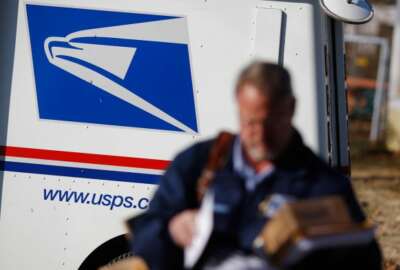An annual Gallup poll puts the Postal Service as tops among federal agencies Americans think do a good job. USPS does, in statistical fact, an effective job of delivering mail. I’m guessing most Americans haven’t seen or paid attention to the USPS balance sheet. If that’s the scorecard of business, the Postal Service has problems. Whether USPS is technically a federal agency, it is in normal people’s eyes.
Among the other federal agencies asked about, Secret Service, CDC, CIA, NASA, FBI, Homeland Security and FEMA all get excellent-or-good ratings, above 50 percent.
Gallup polled for 13 what it calls “high-profile” federal agencies. Poll participants gave lower ratings to the IRS, Federal Reserve Board, FDA, EPA and Veterans Affairs (which the poll still calls “Veterans Administration”).
Again, what does one make of this listing? VA has had terrible publicity for a long time. But it arguably doesn’t do a worse job on average than DHS. Millions of vets get good or unremarkable care every day. TSA catches dozens of nasty pistols, nunchucks and bo shuriken every day. As for the CIA, how is it even possible for anyone without security clearance and access to CIA daily activities to have a qualified opinion?
In an analysis piece, Gallup comments on the FBI’s good ratings in the context of its investigation being taken over by the Robert Mueller special counsel operation and other high-political-profile events. My hunch is most people believe the James-Comey-Rod-Rosenstein-Russia spectacle was generally removed from the day-to-day work of the thousands of regular agents who pursue old fashioned crime. I call that the Efrem Zimbalist Jr. view of the FBI (look it up). I hope it’s still valid.
Whether the Gallup poll has any meaning for public administration might be a question. But federal agencies should have some statistically valid idea of how they are perceived by the public. Few people read, much less are aware of, the endless stream of inspector general and Government Accountability Office audits of the deep nuts-and-bolts of government like personnel management, procurement, finances, program delivery. But they pay taxes, read about or deal with crime, travel through airports, visit VA medical centers, and send mail.
The Gallop poll didn’t ask about many agencies or departments such as Agriculture, Defense, Education, Housing and Urban Development, or Treasury. It leaves unanswered whether people like the more obscure ones such as Overseas Private Investment Corporation, Railroad Retirement Board, or Federal Labor Relations Authority.
Another new Gallup poll showed this: Blacks, Catholics, Hispanics, women, Jews, evangelical Christians, and gay or lesbian people have one thing in common: At least three quarters of Americans would vote for one of them for President. The numbers for all these groups are up in the last five years. The who to vote for question leaves a lot of latitude. Or at least the “what” to vote for question.
Are these results believable? People answer polls like this anonymously. They have no incentive to thump their virtue-signaling chests.
But the Gallup poll released last week showed that only 66 percent would vote for a Muslim for president, 63 percent for anyone over the age of 70 (that’s you Joe, Bernie and Donald), 60 percent for an atheist, and 47 percent for a socialist.
Still, as the GAO would say, there’s progress overall with room for more. When John F. Kennedy was running for president, the Catholic question came up. Queried on this, Harry Truman commented, “It’s not the Pope I’m worried about, it’s the Pop,” a reference to JFK’s dad, Joseph P. Kennedy. Fifty years later the nation elected Barack Obama.
In the last presidential election, 99 percent of voters cast ballots for someone 70 years old (give or take a year).
Like you probably did, I got a chuckle out of this particular Gallup poll. It made me want to ask, well, what about a black socialist? Or a gay Jew? Or a lesbian evangelical? Or a socialist atheist? Or a 72-year old Hispanic? How do the preferences subtract from or multiply one another? I think in reality most people would vote for any ethnic, religious or racial ID if they agreed with the candidate’s positions.
Those who work in federal agencies as a career mostly don’t care what the president is in terms of the categories into which we too often categorize ourselves. They care about whether the president will appreciate what they do and appoint decent people.
Copyright
© 2024 Federal News Network. All rights reserved. This website is not intended for users located within the European Economic Area.

